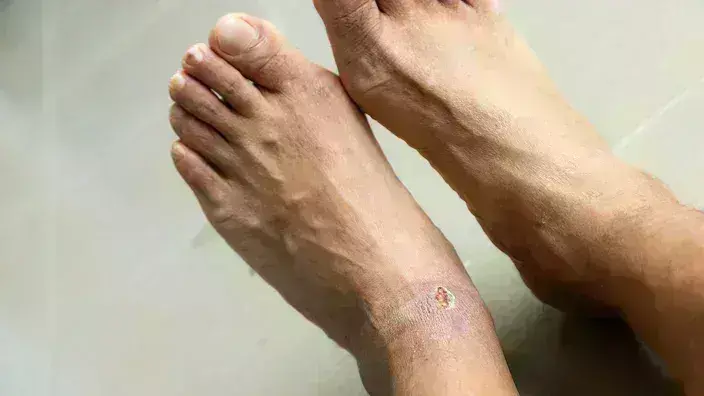- Home
- Medical news & Guidelines
- Anesthesiology
- Cardiology and CTVS
- Critical Care
- Dentistry
- Dermatology
- Diabetes and Endocrinology
- ENT
- Gastroenterology
- Medicine
- Nephrology
- Neurology
- Obstretics-Gynaecology
- Oncology
- Ophthalmology
- Orthopaedics
- Pediatrics-Neonatology
- Psychiatry
- Pulmonology
- Radiology
- Surgery
- Urology
- Laboratory Medicine
- Diet
- Nursing
- Paramedical
- Physiotherapy
- Health news
- Fact Check
- Bone Health Fact Check
- Brain Health Fact Check
- Cancer Related Fact Check
- Child Care Fact Check
- Dental and oral health fact check
- Diabetes and metabolic health fact check
- Diet and Nutrition Fact Check
- Eye and ENT Care Fact Check
- Fitness fact check
- Gut health fact check
- Heart health fact check
- Kidney health fact check
- Medical education fact check
- Men's health fact check
- Respiratory fact check
- Skin and hair care fact check
- Vaccine and Immunization fact check
- Women's health fact check
- AYUSH
- State News
- Andaman and Nicobar Islands
- Andhra Pradesh
- Arunachal Pradesh
- Assam
- Bihar
- Chandigarh
- Chattisgarh
- Dadra and Nagar Haveli
- Daman and Diu
- Delhi
- Goa
- Gujarat
- Haryana
- Himachal Pradesh
- Jammu & Kashmir
- Jharkhand
- Karnataka
- Kerala
- Ladakh
- Lakshadweep
- Madhya Pradesh
- Maharashtra
- Manipur
- Meghalaya
- Mizoram
- Nagaland
- Odisha
- Puducherry
- Punjab
- Rajasthan
- Sikkim
- Tamil Nadu
- Telangana
- Tripura
- Uttar Pradesh
- Uttrakhand
- West Bengal
- Medical Education
- Industry
Nasal MRSA carriage may increase risk for antibiotic resistance in diabetic foot ulcers

Nasal MRSA carriage may increase the risk for antibiotic resistance in diabetic foot ulcers suggests a new study published in the BMC Infectious Diseases.
Diabetic foot ulcer (DFU) is a major complication of diabetes often impacted by polymicrobial infection in the wound site. Diabetic patients are immunocompromised in nature and hence vulnerable to infection once the skin barrier is breached. Microbiological culture-based methods show that Staphylococcus aureus (SA) is the most frequently isolated bacteria from the DFU wounds. SA and its most clinically important antibiotic resistant variant methicillin-resistant S. aureus (MRSA) are commonly found in the nasal vestibule and colonization of SA as well as MRSA in any wound site can aggravate the condition. We hypothesize that the presence of nasal MRSA carriage can serve as a potential risk factor contributing to the emergence of antibiotic resistance in diabetic foot ulcer wounds.
In the present study, we have compared the carriage of SA and MRSA in nasal cavity and foot skin among DFU patients (D+F+, n = 50), diabetic patients without any ulcer (D+F-, n = 50), and healthy controls (D-F-, n = 40) by using bacterial culture and PCR based methods. The D+F+, D+F- and D-F-individuals were further categorized based on the presence or absence of MRSA and clinical parameters were compared between MRSA+ ve and MRSA-ve individuals in each of the three groups mentioned above.
Results
Our results show that, (a) nasal MRSA carriage is significantly higher (p < 0.05) in D+F+ group than the D+F- and D-F- and significantly associated with wound MRSA carriage in D+ F+ individuals (O.R. = 4.09; 95% C.I. = 1.12–15.05) and (b) the HbA1C level is significantly higher (p < 0.02) in wound MRSA positive, compared to MRSA negative D+F+ patients. Interestingly more than half of the MRSA (64%) isolated from DFU wound were identified to be multidrug resistant.
These findings strongly suggest that nasal MRSA carriage can act as a risk factor for development of antibiotic resistance in diabetic foot ulcers and it is therefore important to screen nasal and wound sites of these patients regularly. We have also developed a rapid multiplex PCR assay to detect MRSA from clinical isolates or microbial DNA isolated from clinical samples in the hospital settings.
Reference:
Mukherjee, P., Paul, S., Dutta, T. et al. Nasal MRSA carriage is a risk factor for development of antibiotic resistance in diabetic foot ulcers and is significantly higher than diabetic and non-diabetic individuals without foot ulcers. BMC Infect Dis 23, 729 (2023). https://doi.org/10.1186/s12879-023-08673-3
Keywords:
Nasal, MRSA, carriage, increase, risk, for, antibiotic, resistance, diabetic, foot, ulcers, Mukherjee, P., Paul, S., Dutta, T, Diabetic foot ulcer, Staphylococcus aureus, MRSA carriage, Multiplex PCR, HbA1C, BMC Infectious Diseases
Dr. Shravani Dali has completed her BDS from Pravara institute of medical sciences, loni. Following which she extensively worked in the healthcare sector for 2+ years. She has been actively involved in writing blogs in field of health and wellness. Currently she is pursuing her Masters of public health-health administration from Tata institute of social sciences. She can be contacted at editorial@medicaldialogues.in.
Dr Kamal Kant Kohli-MBBS, DTCD- a chest specialist with more than 30 years of practice and a flair for writing clinical articles, Dr Kamal Kant Kohli joined Medical Dialogues as a Chief Editor of Medical News. Besides writing articles, as an editor, he proofreads and verifies all the medical content published on Medical Dialogues including those coming from journals, studies,medical conferences,guidelines etc. Email: drkohli@medicaldialogues.in. Contact no. 011-43720751


